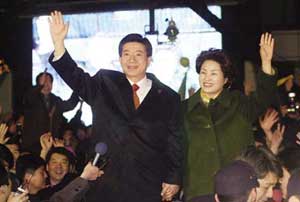Roh Moo Hyun becomes 21st Century''s first Korean President
Korean voters chose to put New Millennium Democratic Party's (NMDP) candidate Roh Moo Hyun in the presidential office to lead the nation in the 21st century. President elect Roh was elected the new president, garnering 12 million 14,277 votes out of 24 million 561,916 votes (48.9%) at the 13,471 polling stations around the nation for 12 hours from 6 am on December 19. Grand National Party's (GNP) candidate Lee Hwe Chang earned 11 million 443,297 votes (46.6%), while Democratic Labor Party's (DLP) Kwon Young Gil came in third with 957,056 votes (3.9%).
707

The people also yearn for the banishment of war threats and national hostilities from the Korean peninsula. They want the sunshine policy consistently advocated by the Kim Dae Jung administration to develop into cooperation and reconciliation between the two Koreas, and ultimately into a united Korea that they can pass on as proud heritage to their descendents.
As for the revision of the Korea-US Status of Forces Agreement (SOFA) that young students rallied for week after week in front of City Hall, candidate Roh's response should be the actual revision of the SOFA. Changing the SOFA - currently a national disgrace dubbed the second Korea-Japan Annex Treaty - into an equal agreement that guarantees Korea's sovereignty and dignity is another urgent task faced by the Roh administration.
Women groups claim that the new president's first and foremost task in the 21st century is the eradication of corruption, a peaceful resolution to the North Korean nuclear issue, and the facilitation of inter-Korean exchanges. Women are also calling for the proper revision of political laws such as the Political Party Act, Political Funds Act and Election Act in preparation for the upcoming 17th General Elections.
Through the commentary that it issued in the morning following the presidential election, the Korea Women's Association United (KWAU) said, "As president elect Roh succeeded in drawing the interest and participation of the young generation with his political integrity, he should go on to eradicate authoritarianism and clan-based politics and use the integrity that voters found so appealing to create a politics of the people, a politics that is clean and based on reconciliation and reunification."
Above all, the KWAU emphasized, "2003, the first year of the new presidential term, is also the year of the second phase of the Women Policies Basic Initiative. Accordingly, the new administration must produce concrete plans to realize its women-related pledges, so that actual gender equality takes root, women rights are respected, and women's participation is guaranteed in all sectors of politics, economy and society."

